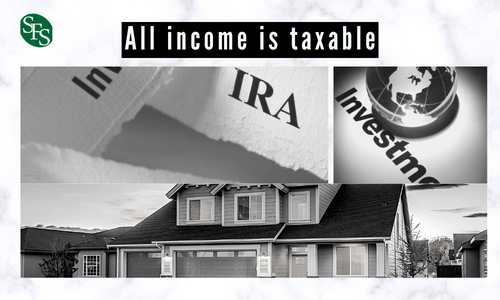IRS Defines Income.. Are you reporting ALL your income?
The Internal Revenue Code defines income as “…all income from whatever source derived…”. So we all know, or should now, that when we earn money, either received by check, charge, cash or trade, it is taxable. That also includes monies received even if we do not receive a tax form (i.e., 1099). This article will be talking about the oldest of business deals, trade or as it is commonly called Bartering.
Quoting directly from www.irs.gov, bartering is the trading of one product or service for another. Usually, there is no exchange of cash. Barter may take place on an informal one-on-one basis between individuals and businesses, or it can take place on a third party basis through a modern barter exchange company. However, there are many things to consider in the taxation of bartering in the United States.
Both parties must pay taxes in a one-to-one barter deal, e.g. when an electrician swaps services with a house-painter. The Internal Revenue Manual states that “The non-cash transactions give rise to taxable income for both parties of the exchange, regardless of whether the exchange is made directly or through a bartering club.”
Barter Exchanges
A barter exchange is any person or organization with members or clients that contract with each other (or with the barter exchange) to jointly trade or barter property or services. The term does not include arrangements that provide solely for the informal exchange of similar services on a noncommercial basis.
Unlike one-on-one bartering, members of exchanges are not obligated to barter or purchase directly from a seller. Instead, when a barter exchange member sells a product or a service to another member, their barter account is credited for the fair market value of the sale. When a barter exchange member buys, the account is debited for the fair market value of the purchase.
Internet-based Barter
The Internet provides a new medium for the barter exchange industry. Pure Internet-based barter companies differ from traditional, organized trade exchanges in that they do not have a physical office. In modern Internet barter exchanges, there is an agreement or process in place to value goods and services exchanged, which is facilitated by the barter exchange for a fee. A barter exchange functions primarily as the organizer of a marketplace where members buy and sell products and services among themselves.
Trade Dollars
Barter exchanges have their own unit of exchange, usually known as barter or trade dollars. Trade dollars or barter dollars are valued in U.S. currency for the purposes of information returns. Trade dollars allow barter to take place between parties when one party may not have a simultaneous need or desire for the goods or services of the other members. Barter exchanges act as the bookkeeper for keeping track of trade dollars that participants accumulate. Earning trade or barter dollars through a barter exchange is considered taxable income, just as if your product or service was sold for cash.
However, some barter deals are tax-free or tax-deferred.
- Gift exchanges. In a gift exchange, I am giving you (for example) a bracelet because you are my friend, and you are giving me your lawnmower as a kind gesture. The difference between a gift and a barter deal is the intent: when we give a gift, we do not intend to receive anything directly in return — but in a barter deal, our supposed “gift” is actually half of a commercial transaction.
- Like-kind exchanges. The goods are “of a like kind”; for example, we are trading real estate for real estate, or a tractor for another tractor. The IRS explains these tax-free exchanges in Section 1031 of the IRS Code: “No gain or loss shall be recognized if property held for productive use in trade or business or for investment (except stock or securities) is exchanged solely for property of a like kind to be held either for productive use in trade or business or investment.” Some fine points:
- This is a tax-deferred exchange, not a tax-free exchange. There is no tax on the item when we acquire it by bartering — but if we ever sell it for cash, we will pay a tax.
- We cannot create a tax-deferred exchange of personal property for property which is to be used for trade, business, or investment. “Like kind” refers to the way in which the property is used, not the type of property itself.
- §1031 or Like Kind Exchanges are very technical and should not be entered into without a qualified tax professional, experienced in these matters.
The IRS knows that some “barter income” is not reported. An IRS Regional Director had said, “Bartering is certainly legal. It is the oldest way of doing business there is. Our concern is that barterers don’t abuse, misuse, or break the law, and there is little doubt that bartering is a little more conducive to that opportunity.” Due to the potential for abuse, IRS examiners/auditors look for indications that we barter. These auditors have been instructed to look for deductions which are based on payments to barter clubs or barter brokers; these deductions might include membership fees, annual dues, service charges, etc.
1.The concept of “fair market value” is widely used when barter transactions are being taxed. The IRS says: “Fair market value is defined as the price at which the property would change hands between a willing buyer and a willing seller, neither being under any compulsion to buy or sell, and both having a reasonable knowledge of the relevant facts.
2.Form 1099B, Proceeds from Broker and Barter Exchange Transactions, provided annually by the exchange to their clients or members and to the Internal Revenue Service
3. Memorandum Number 200411042 published on March 12, 2004 by the Office of Chief Counsel of the Internal Revenue Service


